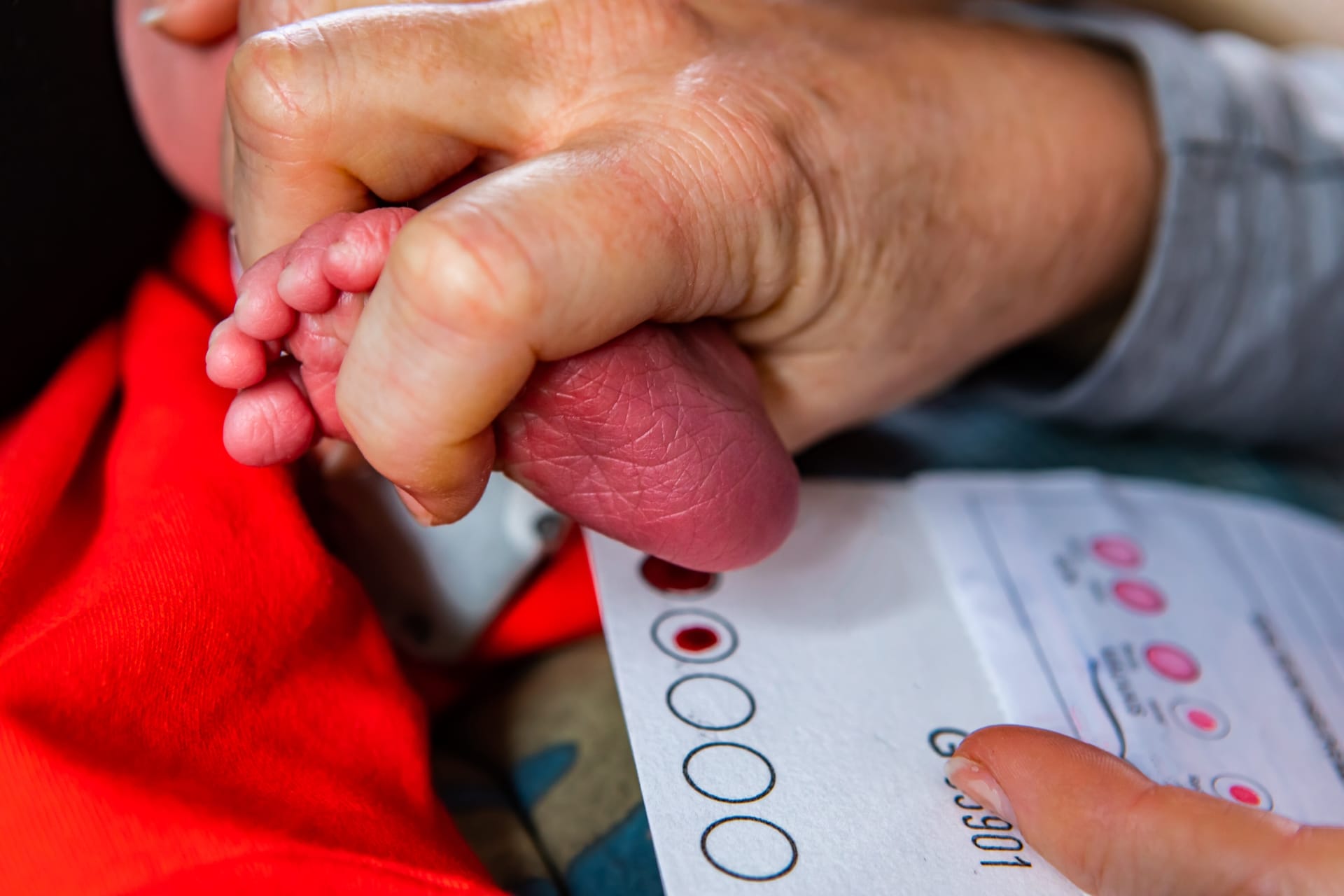Genomic conversations: whole genome sequencing of babies from birth

How do you feel about sequencing the whole genome at birth? In this conversation page, we’ll explore the use of whole genome sequencing in newborn babies – including some of the benefits, risks and what the future may hold.
Key terms
Genome
The complete set of genetic instructions required to build and maintain an organism.
Whole Genome Sequencing
(or full genome sequencing) The process of determining the entirety of an organism’s genome.
Genetic condition
A condition caused by a change in an individual’s DNA.
Genetic testing
A type of test used to identify changes in DNA, chromosomes or protein production, which might be linked to a medical condition.
Whole genome sequencing of babies from birth
In the UK, every baby is currently offered the newborn blood spot test. This optional test takes a small sample of blood from the baby’s heel, looking for nine rare genetic conditions – including cystic fibrosis and congenital hypothyroidism – so they can be quickly matched to any necessary treatment or care.
But what if we moved beyond this narrow set of conditions – and sequenced the entire genome?
Evidence suggests this could help babies receive an early diagnosis if they aren’t currently being tested for health conditions, ensuring they are quickly matched to the right care for them. Individuals could also learn about their risk of other conditions that may affect them later in life, such as certain cancers or neurodegenerative conditions.
For now, however, it represents a step into many unknowns – including how to manage consent, how to manage tests and follow-up consultations in an already stretched healthcare system, and how to store individuals’ data securely and appropriately.

The Generation Study (formerly known as the Newborn Genomes Programme) is testing the benefits, challenges and practicalities of whole genome sequencing in up to 200,000 newborn babies.
The Generation Study is exploring the benefits, challenges and practicalities of whole genome sequencing the genomes of newborn babies, by offering the test to up to 200,000 newborn babies, consented by their parents. Run by Genomics England and the NHS, the study is looking specifically at around 500 different genes that can cause rare genetic conditions and affect early childhood health. Anonymised data will also be used by researchers to investigate the link between genetic variation and rare conditions.
Different people, different opinions
Over the next few sections, you’ll hear from Heba, Erik and Frank – three people with links to the Wellcome Genome Campus. They’ll share their thoughts and feelings about using whole genome sequencing in newborn babies.

"I think whole genome sequencing at birth is a good idea. It could help diagnose diseases early and help genetic research by improving our understanding of genetic variation."
Heba, Advanced research assistant

"The idea of the whole genome sequencing of babies makes me feel uneasy."
Erik, Cell biologist

"While I can see the benefit of knowing potential future illnesses in advance, it’s not guaranteed that these conditions will develop. This could cause unnecessary panic to families and expense to the health service."
Frank, Human resources
There is clinical evidence that screening for genetic conditions can save lives, providing opportunities for early diagnoses to match patients to effective, targeted treatments or ensure they receive regular check ups to monitor any changes.
Whole genome sequencing at birth would take this a step further. Many children with rare conditions undergo a long, stressful journey of multiple tests to reach a diagnosis – whole genome sequencing could protect families from this process by predicting whether their child will develop a condition, before symptoms appear.
Did you know?
It’s estimated that more than 3,000 babies a year could benefit from lifesaving or life-changing interventions enabled by whole genome sequencing (as calculated by the Genomics Analysis in Children Task and Finish Group).
One example is the first child to receive a diagnosis through the 100,000 Genomes Project. After many unsuccessful diagnostic tests to understand their symptoms and epilepsy, genomic sequencing revealed a variation in the SLC2A1 gene, causing a very rare condition called GLUT1 deficiency. This diagnosis meant the child could be matched to a tailored diet to help with their symptoms and a special medicine for their epilepsy.
Genomic testing could also help clinicians make decisions about which treatment their patient should be matched to – not just during infancy, but throughout life. This could make treatments more effective and avoid side effects for treatments that may provide little benefit to the patient.
Different people, different views
“From a research perspective, having sequencing data on all patients, from different backgrounds and ethnicities, would lead to an extremely large amount of data. This would be very useful for identifying genetic variation associated with health and disease.” - Erik
“Tests like this could help a family spot a disease early and take the necessary measures to prevent or treat it. On a larger scale, I could see that testing at scale could help us to understand human disease and genetics better.” - Heba
“Knowing your child has a condition or an increased risk of disease could mean you can take appropriate steps to intervene. But I’m not sure I would want my insurance to know how prone I am to something like heart disease.” - Frank
Are there benefits to sequencing the whole genome of newborn babies?
Many considerations surround whole genome sequencing in newborns. For example, although the parents are likely to be supported to make an informed decision, the child is unable to consent to the sequencing and long-term storage of their genome.
There are ethical considerations about the results of the test, including that the child may be diagnosed with a serious condition that isn’t fully understood or for which there is no treatment. Further, the child may never develop the condition they have been diagnosed with – risk is a complex relationship between genetics, environment and other factors.
Adding babies with genetic anomalies but no current symptoms to already oversubscribed treatment waiting lists may compromise resources needed for children who are already ill. To protect their time and resources, paediatricians may choose not to work with these children until they develop symptoms – leaving the families in limbo.
Each scenario could cause significant stress while a family waits for symptoms to appear, or if a child undergoes pre-emptive treatment that might provide them little benefit.
There are also questions around data privacy and storage. For example, if genomic data is made available to third parties in the future, it could be used to infer current and future health and lead to discrimination in employment, healthcare and insurance.
Different people, different views
“My greatest concern is that this sort of data could be used to promote eugenics or a racist ideology, especially if the tests are eventually used during pregnancy. I worry that this would be the beginning of breeding the perfect person who is free of all major illnesses.” - Frank
“There might be a risk of discrimination, for example if a person’s workplace knew they had an increased risk of certain conditions.” - Heba
“There’s a risk of stress caused by genetic determinism – those carrying variants associated with disease may believe they have a 100% chance of developing the disease, but it’s often not the case. There’s also the risk of genome data being used to charge people differently for healthcare or insurance.” - Erik
Are there limitations or risks to sequencing the whole genome of newborn babies?
Storing genomic data, regardless of the initial screening outcome, means it can be re-analysed and potentially provide the individual with access to new developments in genomics and healthcare.
While there are currently no specific, UK-wide regulations, it’s crucial this data is stored securely and used appropriately. The Generation Study is currently exploring the ethical and practical implications of storing a lifetime genomic record, including how and when the data could be reanalysed.
Currently, the data is stored anonymously and would need to be relinked to the individual to have an impact on healthcare later in life. Many studies are currently exploring the most appropriate way to store data like this, so that it can benefit research but not abuse the privacy of the individual.
There are also steps that can be taken to alleviate some of the ethical considerations. For example, tests can be targeted to only focus on specific conditions. The Generation Study only looks for genetic conditions that can be reliably detected, could have a debilitating effect on the child if undiagnosed and have interventions available to prevent, cure or change the course of the condition.
Additionally, genomic sequencing in adults is often undertaken with a genomic counsellor who can explain the outcomes of the tests. Should midwives receive extensive genomics training to support conversations about newborn whole genome sequencing? If so, what would be the financial and logistical implications for our healthcare services?
Different people, different views
“Whole genome sequencing data could be used by trusted institutions for research purposes, but it must be stripped of identifiable data. There should be regulations to restrict access to person-linked data, as this would be a breach of privacy and is open to abuse. Unrestricted access should only apply to summary statistics, and not to individual data points.” - Erik
“There needs to be regulations around confidentiality and privacy so that an individual’s data isn’t made available to third parties without their consent.” - Frank
What is the guidance around the sequencing of genomes?
The first near-complete human genome took 13 years to complete. Technologies have exponentially improved in the years since, so that in 2022, the Wellcome Sanger Institute produced a gold-standard human genome every 12 minutes.
This technology is already being used by adults to help understand their ancestry and risk of certain conditions, both with genetic counsellors and with direct-to-consumer tests. From diagnosing conditions to matching people to the right treatment for them, genomics and genetics are only going to become more important in medicine.
Whole genome sequencing at birth offers great potential to improve the lives of children with as-yet undiagnosed rare genetic conditions. But it also brings a host of questions related to ethics, logistics and practicalities.
Studies like the Generation Study are seeking to understand these questions, including how to balance the benefits of early diagnosis with the risk of uncertainty in newborn results and considerations around long-term data storage. It’s likely that some of these questions will also be answered by the wider health data research field.
And with an already stretched healthcare system, will it ever be logistically possible for whole genome sequencing to become a routine part of newborn healthcare?
Different people, different views
“As a scientist who investigates the role of genetic variation in human disease, I can see genomic testing at birth becoming a routine part of normal healthcare.” - Heba
“I can see the benefits of routinely performing targeted genome sequencing, rather than whole genome sequencing, to understand the risk of specific diseases.” - Erik
“Provided tight regulations are in place, I can see this becoming part of routine healthcare. However, in a fair world, everyone would receive the same treatment – whether you live in a rich country or a poorer part of the world. I worry this will expand health inequalities further.” - Frank